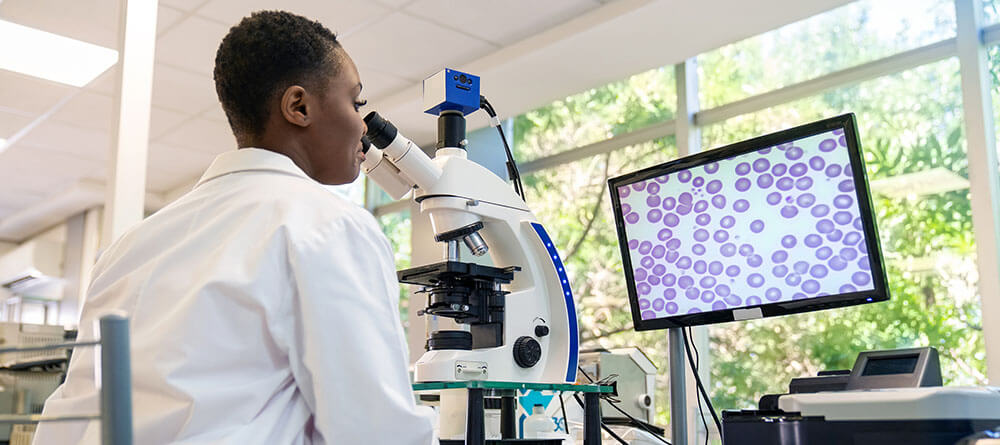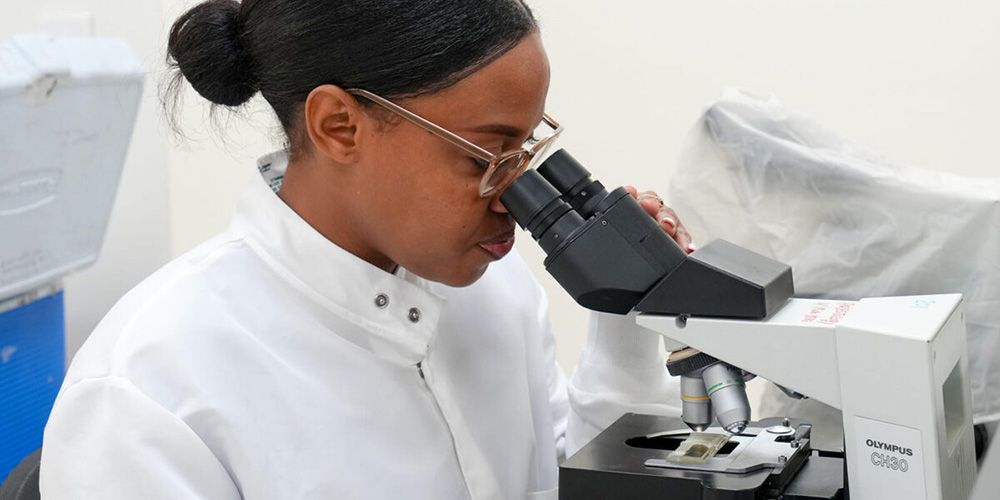With a growing community of true crime enthusiasts, there has been increased interest in the field of forensic pathology. But what is pathology really, and does it look anything like what you’ve seen on Law and Order? To put it simply, it depends.
What is pathology?
“Pathology is the study of abnormal microscopic findings,” says Dr. Ewarld Marshall, St. George’s University associate professor and chair of the department of pathology and director of the pathology diagnostic lab.
Pathology investigates the etiology, or the cause of a disease, and its trajectory. It is a broad field with many different avenues. Under the umbrella of medical pathology, there are three main types: anatomical, clinical, and molecular pathology. Within each of those disciplines, pathology branches out further. This is where you encounter specialties like:
- Blood banking and transfusion medicine
- Chemical pathology
- Clinical informatics
- Cytopathology
- Dermatopathology
- Forensic pathology
- Hematopathology
- Medical microbiology pathology
- Molecular genetic pathology
- Neuropathology
- Pediatric pathology

What does a pathologist do?
Sometimes called “the doctor’s doctor,” pathologists help a patient’s physician make or confirm a diagnosis by studying tissue and fluid samples. Pathologists can help identify an appropriate treatment plan based on their knowledge of what the patient is likely to experience in the coming days and weeks.
“Pathology gives you an idea of what is happening at the site of the disease,” says Dr. Marshall. “Once you understand that, then you can go to the next step, which is to explain it and design therapeutic measures.”
Depending on the type of pathology, this might look like conducting blood investigations to look for bleeding disorders, studying pap smears to detect cervical cancer or pre-cancer, or performing autopsies to determine the underlying disease process and cause of death.
Dr. Marshall explains that in the field of forensic pathology specifically, experts must predict or give an expert opinion on what could have caused the outcome based on the biological evidence available.
“You are a detective for all intents and purposes when you practice pathology,” says SGU grad Kelise Harris, MD ’24, who is beginning her first year of her anatomical and clinical pathology residency at Montefiore Medical Center in Bronx, NY. Dr. Harris is an aspiring forensic pathologist.
Dr. Harris started her journey in forensic pathology as an assistant in the medical examiner’s office to help her land her pathology residency. There, she helped with autopsies and visited crime scenes.
“I wanted to become a medical examiner,” she says, “so that opportunity placed me in the environment I want to work in.”
Forensic pathology may be one of the more well-known pathology specialties, but in 2020, the field of pathology was on everyone’s radar for a different reason.

Pathology and COVID-19
The field of pathology was brought to the forefront during the global pandemic as medical professionals sought to learn as much as they could about the COVID-19 virus. Experts needed to understand how the virus affected the body, how it was spread, and how to effectively treat it, which they did via research and studying similar strains.
During the early days of the pandemic, Nicholas Boire, MD ’19, was completing his anatomical and clinical pathology residency at the Mayo Clinic in Rochester, MN. There, he was part of a team of pathologists who performed some of the early autopsies on COVID-19 patients and published a case report citing its findings. He and his team found neuropathological abnormalities that had not previously been documented. This helped to understand the progression of the virus in hospitalized patients, which meant doctors could better identify and manage the disease.
“COVID-19 (as a pathogen) has been fascinating with regards to my specialty,” says Dr. Boire in an SGU News story sharing his experience. He is now a medical microbiology fellow at Brigham and Women’s Hospital in Boston, MA.
For Dr. Marshall, the pandemic underscores the need for pathologists and their work on an ongoing basis.
“One of the things that makes pathology very important is that everyday medicine is changing, and as research is done, new methods of diagnosis and new pathological findings can occur,” he says. “You’re always learning, you’re always developing, you’re always helping.”
I’m considering pathology—where do I start
The road to a pathology residency and beyond starts out the same as it does for any other medical field. To become a resident in pathology, you first need to attend a four-year medical school to build a solid educational foundation. You’ll devote the first half of your education to classroom instruction and lab work.
The final two years will be spent completing clinical rotations to get more familiar with working with patients. And as with other medical specialties, you’ll begin the United States Medical Licensing Examination (USMLE) series during medical school. You won’t take the final USMLE test until residency, where you’ll also obtain board certification.
Once you complete four years of medical school, you will begin residency. The length of pathology residency programs is about four years encompassing both clinical and anatomical pathology. Pursuing a subspecialty like forensic pathology is usually an additional year in a fellowship.
As a newly minted MD pursuing pathology, Dr. Harris acknowledges that her chosen path may not be for everyone. She believes while pathology is a rich field, it requires a certain level of interest, just as with any area of specialization. This is important to keep in mind when considering pathology residency programs.
“It is a great specialty with much to offer anyone interested or willing to explore,” she says. “You only have to keep an open mind.”
Dr. Marshall affirms that a career in pathology can be very rewarding, despite being different from other specialties. A career in pathology may not be as fast paced as an emergency room physician or surgeons, but it can also be much more mentally stimulating, he says. Those who thrive in the field should be interested in research and have a keen eye for detail, as pathologists routinely look at the cellular level.
“You must love medicine to be a pathologist.” he says. “It’s a beautiful specialty because it helps you to become a better clinician. It’s a very foundational science that is the basis for diagnosis and subsequent treatments and patient care.”
Take the first steps to becoming a doctor
Now that you know more about what a pathologist does, you may be starting to envision yourself thriving in this complex physician role.
To set you on the path to be a resident in pathology and beyond, you’ll need to gain admission to medical school. Learn more about the road ahead by reading our article “Understanding the Medical School Application Process.”
*This article was originally written in 2023. It has since been updated to include information relative to 2024.


